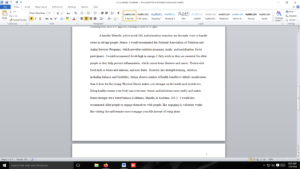Nutrition, Exercise, Stress Management
Topic 1: Nutrition, Exercise, Stress Management: Clinical Prevention Intervention and Evaluation.
Read the required reading. You have a client from a vulnerable population, such as an economically disadvantaged and older adult, who needs to begin lifestyle changes with nutrition, exercise and stress management modifications. Discuss how you would approach nutrition, exercise and/or stress management counseling. Address food aid programs that would be appropriate for referral. What exercise recommendations would be appropriate for your client/s. Comment on stress management factors that may need addressed with your choice of the vulnerable population.
TEXTBOOK INFORMATION
MediaType: Title: Edition: Author: Publisher: Book ISBN: Ebook ISBN:
MediaType: Title: Edition: Author: Publisher: Book ISBN: Ebook ISBN:
Physical
Clinical Epidemiology: The Essentials 5th (2012)
Fletcher, Robert and Fletcher, Suzanne Lippincott
978-1451144475
Physical
Health Promotion Throughout the Life Span 9th (2017)
Edelman, Kudzma and Mandle
Mosby
978-0-323416733
Unit 7 Reading Assignments
In Health Promotion throughout the Lifespan in Nursing Practice, read:
Chapter 11: “Nutrition Counseling for Health Promotion”
Chapter 12: “Exercise”
Chapter 13: “Stress Management”
Chapter 14: “Complementary and Alternative Strategies”
Ackley-Holbrook, E., Minsoo, K., & Morgan, D. W. (2016). Development and evaluation of the Walk for Health Program: A physical activity intervention for adults with visual impairments. Journal of Visual Impairment & Blindness, 110(2), 103-114.
Dietary Guidelines for Americans 2015-2020. (2015). Table of contents. Retrieved from https://health.gov/
Physical Activity Guidelines for Americans. (2018). Index. Retrieved from https://health.gov/
Riemer, H. C., Mates, J., Ryan, L., & Schleder, B. J. (2015). Decreased stress level in nurses: A benefit of quiet time. American Journal of Critical Care, 24(5), 396-402.
Rosenberg, K. (2017). Complementary medicine relieves some types of chronic pain. American Journal of Nursing, (1), 61.
Web Resources
● Centers for Disease Control and Prevention [CDC]. (2014). Principles of epidemiology in public health practice. An Introduction to applied epidemiology and biostatistics. (3rd ed.).. Retrieved from https://www.cdc.gov/csels/
● Department of Health and Human Services. (2018). Leading health indicators. Retrieved from http://healthypeople.gov/2020/
● Healthy People 2020. (2018). Topics and objectives. Retrieved from https://www.healthypeople.gov/
● United States Preventive Services. (2018, March). USPSTF A and B recommendations. Retrieved from https://www.
Requirements: 3 paragraphs
Answer preview
consumption, and low appetite leading to loss of weight.
A healthy lifestyle, active social life, and relaxation exercises are the main ways to handle stress in old age people. Hence, I would recommend the National Association of Nutrition and Aging Services Programs, which provides nutrition programs, meals, and socialization for its participants. I would recommend foods high in omega-3 fatty acids as they are essential for elder people as they help prevent inflammation, which causes heart diseases and cancer. Protein-rich food such as beans and salmons, and also fruits. Exercise like strength training, aerobics, including balance and flexibility, brings about a surplus of health benefits to elderly people more than it does for the young. Physical fitness makes you stronger on the inside and outside too. Being healthy means your body can overcome viruses and infections more easily and makes bones stronger for a better balance (Edelman, Mandle, & Kudzma, 2017).
[376 Words]

Nutrition Exercise Stress Management

